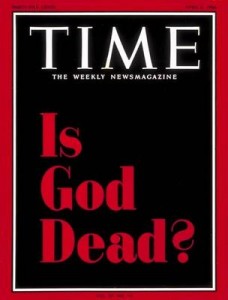On Halloween I had the opportunity to be a part of a panel on religion and zombies at Emory University’s symposium on Zombies and Zombethics. This session was sold out, and filled with lots of interested listeners. My colleague and friend Scott Poole, author of Monsters in America, was one of my fellow panelists, and our presentations overlapped somewhat as they addressed nihilism in horror and the zombie subgenre. You can find a summary of Scott’s fine presentation on his website.
My presentations served as something of a counterpoint to Scott’s, but did present areas of agreement and overlap in contemporary horror’s fascination with nihilism and how this manifests in a critique of aspects of the Christian narrative in its eschatology, attitudes to the soul and body, and the hopes for life after death. However, my presentation noted that while the postmodern and post-Christendom (distinguished from the post-Christian) aspects of contemporary horror critiques Christian eschatology, it also presents a “neo-apocalyptic variant” that must be wrestled with as well. In addition, my research on the zombie walk phenomenon also reveals that in addition to expressing aspects of entertainment and performance art, participants may also be flirting with subversive ideas related to death and the body, monistic rather than dualistic concepts in human nature, and a synthesis of Christian and metaphysical ideas related to what Catherine Albanese has called the “enlightened body-self.” I concluded by suggesting that theologians need to take such pop culture phenomena seriously through an expanded concept of the sacred, and that by adopting an inductive theological method as in Peter Berger’s approach in A Rumor of Angels, some expressions of the zombie walk may reflect “signals of transcendence,” hints of a connection to the divine through mundane activities that transcendentalizes secularity. These and related ideas are developed more fully in my chapter contribution to https://wipfandstock.com/store/The_Undead_and_Theology titled “Zombie Walks, Zombie Jesus, and the Eschatology of Postmodern Flesh.”
It should also be noted that the subject of nihilism in contemporary horror is a major issue for consideration by scholars and theologians. There is much to discuss and debate as to whether horror’s penchant for nihilism, displayed for example each week in The Walking Dead and in Joss Whedon’s film The Cabin in the Woods, represents an intractable problem for theistic conceptions of the cosmos in favor of atheism, or whether the school of the Graveyard Poets from the past in the Gothic tradition can, with appropriate updating in light of the challenges of modernity and postmodernity, provide some redemption and a “horror with hope” in a contemporary eschatology. The often heated discussion by Matt Cardin at The Teeming Brain, and the work of Scott Poole and myself, point to the significance and relevance of this issue for contemporary discussion among scholars.






Thanks a heap for the summary of your talk, John, and also for the link to Scott’s summary of his own presentation. I would love to have been there, so this is the next best thing. And yes, indeed, the entangled relationship of nihilism with transcendence and/or intimations of the numinous and sacred in contemporary horror is, as they say, where it’s at. I tend to think that, given the wholesale transformation of mass culture into an increasingly fantasy-dominated pop culture — in other words, given the collapsing together of culture at large with what used to be the subculture of fantasy/horror/science fiction — these issues are crucially involved in the deep re-evaluation of science, materialism, religion, consciousness, and so on that has suddenly come to characterize our public discourse.